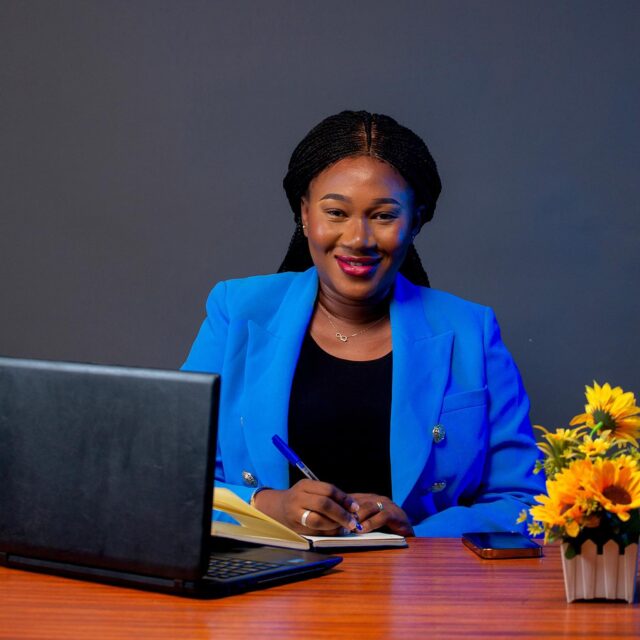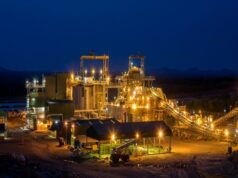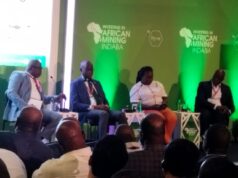Vanessa Diasso is a television star in Burkina Faso. A journalist and editor-in-chief at Burkina Info television, she was selected from among a hundred or so others to be part of a group of around twenty people to be trained in Yaoundé from 17 to 28 July 2023, as part of the 12th session of the Summer University on the Governance of Extractive Industries. In this interview, she explains the content of the training and its prospects in the mining sector.
Could you introduce yourself to our readers?
I’m Vanessa Diasso, journalist and editor-in-chief at Burkina info television. I’m passionate about politics, economics and mining. I also present the weekly programme 100% Info on the Burkina Info channel.
You are taking part in the Summer University on the Governance of Extractive Industries in Yaoundé, Cameroon. Tell us about this programme.
The summer school is organised by the Centre of Excellence for the Governance of Extractive Industries in Francophone Africa (CEGIEAF) of the Catholic University of Central Africa (UCAC), with the support of the Natural Resource Governance Institute (NRGI). From my point of view, these are the give-and-take frameworks on the extractive industry in Francophone Africa and elsewhere. It is an annual meeting organised for a wide range of players (journalists, politicians, civil society players) to give them the keys to understanding the mining sector, and to understand their role in improving policy and monitoring the actions taken to have a positive impact on policy and people’s lives.
How did you get selected?
I was selected following an open call for applications launched by the CEGIEAF several months ago. 122 applications were received, but 24 participants were selected. They came from 9 countries, including Burkina Faso, Cameroon, Guinea, Mauritania, the Democratic Republic of Congo, Congo, Senegal, Chad and Togo. My application was selected on the basis of the information I submitted, the work I had done in the sector and my motivation. After 3 months of preparatory work, I had the immense honour and pleasure of being part of this 12th promotion of actors trained by this centre of excellence recognised in Africa. I would like to take this opportunity to thank the management of the CEGIEAF for choosing me and all the other people who have placed their trust in me.
How do you rate the course content?
The word COMPLETE perfectly sums up the content of the training we are receiving during this summer university. From the reasons behind the decision to mine, to the political economy of the extractive industries, the framework for contracts, taxation in the extractive sector, auditing, local content policy, the African mining vision, budgeting and much more, all the segments of the extractive sector that are taught to the learners that we are. Some aspects are technical and require more in-depth study at a later stage, but on the whole, we have comprehensive information on the extractive sector (mining, oil and gas). Ignorance being a disease in my view, so I think we’re getting the right treatment here. Modules are taught by experts in the field from many African and European countries.
More specifically, what aspects have you learnt the most about?
The composition of a mining contract, its content, the African mining vision and auditing were the points that I found most interesting. The basics of taxation were also interesting, although some aspects were a bit technical. Understanding the local content policy was also a plus for my personal understanding. Above all, what I liked was the sharing of experience between participants from different countries. It’s always rewarding to find out what’s being done elsewhere so that you can learn from the good examples and implement them at home. The discussions on energy transition, a topical subject, gave us a better understanding of the issues surrounding this question.
How do you plan to apply what you’ve learned?
I intend to put the information I’ve already received to good use by stepping up my interest in mining-related issues, by organising debates around structural and specific questions linked to the field. In addition, I’ll be doing more journalistic work in the sector.
Any last words?
In closing, I would like to reiterate my heartfelt thanks to the organisers of this 12th summer university (UCAC and NRGI) for the warm welcome and the quality of the training, to the experts who were all brilliant and had a mastery of teaching, and to all the participants for the friendly exchanges and the networking that was established.
Interview by Pierre Balma
Mines Actu Burkina
I was selected on the basis of of an open call for applications launched by the CEGIEAF many months ago. 122 applications were received, but 24 participants were selected. They came from 9 countries, including Burkina Faso, Cameroon, Guinea, Mauritania, the Democratic Republic of Congo, Congo, Senegal, Chad and Togo. My application was selected on the basis of the information I submitted, the work I had done in the sector and my motivation. After 3 months of preparatory work, I had the immense honour and pleasure of being part of this 12th promotion of actors trained by this centre of excellence recognised in Africa. I would like to take this opportunity to thank the CEGIEAF management for choosing me and all the other people who have placed their trust in me.










